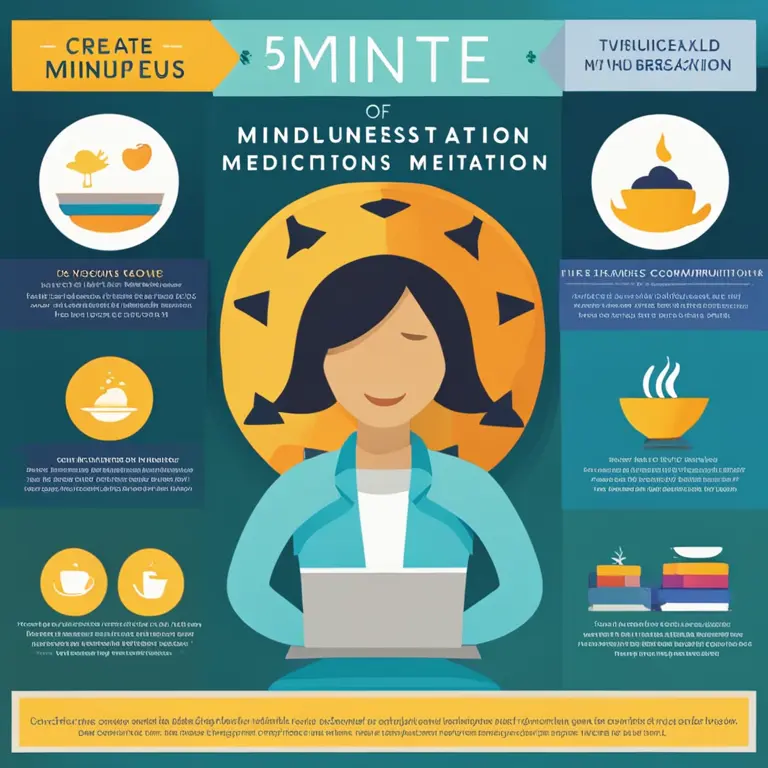
5-Minute Mindfulness Meditation
Embrace peace and cultivate inner tranquility with our 5-minute mindfulness meditation practice.
article by Hina Kurosawa
Introduction to Mindfulness Meditation
Mindfulness meditation has emerged as a powerful tool to reduce stress and improve overall well-being. In our fast-paced world, carving out time for prolonged meditation sessions might seem demanding. However, mindfulness doesn't have to be time-consuming. Even five minutes of intentional breathing and awareness can have profound effects. This article will guide you through an effective 5-minute meditation that can slot seamlessly into your busy schedule, providing immediate benefits and paving the way toward a more mindful existence in 2024 and beyond.

Setting the Scene
Before diving into the meditation, it's essential to create an environment conducive to relaxation. Find a quiet space where you won't be disturbed. Sit or lie down comfortably, making sure your back is straight but not stiff. Place your hands on your knees or by your sides, whichever feels more natural. Gently close your eyes or lower your gaze, whichever you prefer. With advancements in technology, there are now numerous apps and devices designed to enhance your meditation space with ambient sounds or guided instructions, if desired.

Breathing for Awareness
Breath is at the core of mindfulness meditation. Begin by taking a deep, slow breath in through your nose, filling your lungs completely. Notice the sensation of your chest expanding and the cool air entering your nostrils. Exhale gently through your mouth, paying attention to your body's response as it releases the air. Repeat this process, drawing your focus to the rhythm of your breathing. As distractions arise, acknowledge them without judgment and gently redirect your attention back to your breath.

Engaging the Senses
Enhance your practice by incorporating your senses into this moment of mindfulness. Identify the different sounds you can hear—maybe a faint ticking of a clock or distant traffic. Observe the sensations on your skin, like the slight pressure of your clothing or a passing breeze. Notice any tastes lingering in your mouth or aromas around you. By engaging your senses, you ground yourself in the present moment, allowing your mind to settle into a state of calm focus.

Embracing Stillness and Thoughts
As you continue to breathe and engage your senses, thoughts will naturally bubble to the surface. Instead of trying to force these thoughts out, acknowledge their presence and let them pass like clouds across a sky. Embracing stillness isn’t about having a blank mind—it's about being present with whatever comes up without getting entangled. As 2024 sees continued advances in neurofeedback and AI-assisted meditation, the emphasis remains on embracing human consciousness in its natural state, thoughts and all.
Concluding Your Meditation
After five minutes, or whenever you feel ready, slowly commence your transition back to the usual pace of life. Take a moment to acknowledge the state of calm you’ve fostered. Wiggle your fingers and toes, roll your shoulders, and when you feel ready, open your eyes. Carry the mindfulness fostered in these five minutes with you through the rest of your day. Regular practice even for such short durations can lead to improved mental clarity, reduced stress levels, and a greater sense of peace.
Published: 1/18/2024
Modified: 1/18/2024
More predictions
Come back here soon to learn more about yourself and your future


Mindfulness Meditation As A Tool for Anxiety Relief
Discover how mindfulness meditation can be a powerful tool for anxiety relief, fostering a sense of peace and well-being through simple, guided practices.


The Connection Between Meditation & Mindfulness
Discover the relationship between meditation and mindfulness, and how these practices contribute to mental clarity and inner peace.


Mindfulness & Meditation: Enhancing Cognitive Flexibility
Discover how mindfulness meditation can foster cognitive flexibility, improving your ability to adapt to new situations and think creatively.